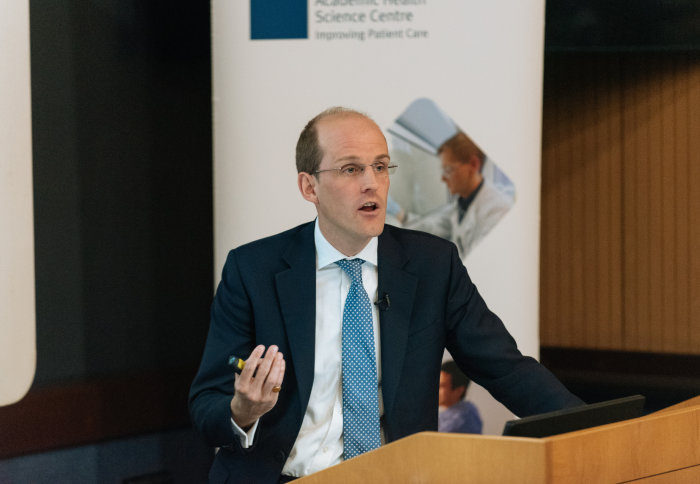Experts explain how big data and AI will help patients
by Maxine Myers

Big data and artificial intelligence (AI) are helping doctors make better treatment decisions and improve the delivery of care, say Imperial experts.
Dr Aldo Faisal, Reader in Neurotechnology jointly at the Department of Bioengineering and the Department of Computing at the College, and Mr Erik Mayer, Clinical Senior Lecturer at the Department of Surgery & Cancer at the College and Honorary Consultant Surgeon at The Royal Marsden NHS Foundation Trust and Imperial College Healthcare NHS Trust, presented their work on big data and AI at the recent Imperial College Academic Health Science Centre (AHSC) seminar series.
In a packed lecture theatre, Dr Faisal outlined his work on using artificial intelligence to help doctors make better treatment decisions for the condition Duchenne muscular dystrophy.
Duchenne muscular dystrophy is a genetic muscle wasting disease that begins in childhood and mainly affects boys. It usually renders patients unable to walk by age 12 and carries an average life expectancy of 26 years.
In the UK, 2,500 people currently live with the disease and, despite significant recent developments in treatment options, there is no cure for the disease.
Dr Faisal outlined his work to develop and test an innovative bodysuit that measures movements during everyday life, in a number of boys with and without Duchenne in a clinical trial.
During the trial, the boys will wear the suit 24/7 on selected days, allowing it to measure how their body interacts with the world around them.
The bodysuit feeds data back to the research team in real time, where they use AI to make sense of data patterns and determine whether any new treatment regimes are working. From there, doctors can make better informed decisions on treatment and management of the condition. The team will also use this information to develop digital biomarkers to predict health outcomes.
In the video above, Mr Mayer shared his work on developing new software to process patient feedback more effectively and help clinical staff make improvements to the delivery of care.
Currently, Imperial College Healthcare NHS Trust receives almost 20,000 patient comments a month from a range of channels including surveys, forms and correspondence. These comments are processed and read manually, and based on the volume of comments to process, this means that there is less time for teams to respond to that feedback and make required changes to care delivery.
Supported by a Health Foundation innovating for improvement award, this new software processes all free-text patient feedback and groups it into themes in order to better identify and prioritise areas for improvement. This information, provided in near real-time, is then seen by front-line staff using data visualisations to allow them to improve the quality and safety of care in a timely manner based on current patients’ needs.
Mr Mayer also talked about the Care Information Exchange programme, which is an innovative system to allow patients across North West London to access their clinical records and share them with their care teams. The programme supports NHS England’s priority of improving health and care records interoperability, by allowing different information technology systems to securely exchange data, and use the information that has been exchanged to directly benefit patient care and care coordination.
The programme also places patients at the centre of how their data is used and allows them to truly ‘partner’ in their care.
The seminar was the first in a series at The Royal Marsden NHS Foundation Trust designed to showcase the work of the AHSC, a partnership between Imperial College London and three NHS Trusts.
Article text (excluding photos or graphics) © Imperial College London.
Photos and graphics subject to third party copyright used with permission or © Imperial College London.
Reporter
Maxine Myers
Communications Division
